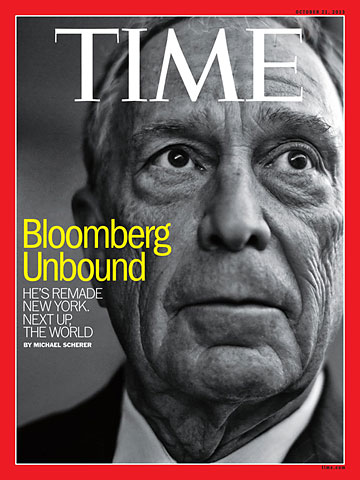
(6 of 7)
But on most issues he is involved in, from climate change and abortion to guns and obesity, Bloomberg sits squarely at the liberal end of the political spectrum. (His defense of Wall Street and support for stop-and-frisk policing are clear exceptions.) This is clearest in his gun campaign, an effort to almost single-handedly fund a grassroots effort to counter the effect of the National Rifle Association, even if it means defeating Democrats and electing Republicans. Earlier this year, Bloomberg's money proved instrumental in passing background-check laws and other restrictions in Connecticut, New York, Colorado and Maryland. More recently, the NRA struck back, funding successful recall campaigns, with some help from the Koch family, against two state politicians in Colorado. Bloomberg refuses to see that defeat as a setback or to revise his ambitions. The Colorado gun-control law, he notes, remains on the books. "What do you mean we lost? I'm sorry for those two people," he says. "But we won in Colorado. On to the next state."
In addition to his homes in Bermuda; London; Vail, Colo.; upstate New York; and the Upper East Side, Bloomberg has acquired perhaps the best symbol of this new gilded age of philanthropy. In 2006, he purchased for $45 million a six-story Beaux Arts limestone-and-brick mansion on East 78th Street in Manhattan as a home base for his philanthropic efforts, his own money-management team and the opinion section of his media empire, Bloomberg View. The building was erected at the end of the 19th century by Stuyvesant Fish, a railroad baron.
After gutting and refurbishing it as a futuristic office building, with window shades that automatically respond to the sun, Bloomberg outfitted the place with rotating art exhibits along with giant saltwater fish tanks that long ago became a trademark of any Bloomberg outpost. In many ways, he sees himself as the legatee of the last great boom in American wealth and even a few before that. His New York home is appointed with a Georgian Chippendale couch estimated to be valued at $1 million, and his friends have mused about his admiration for the lifestyles of the 19th century railroad barons. "Look, there have been great billionaires all along," Bloomberg says when asked about his place in history. "If you think of what the Rockefellers have done, or the Carnegies or Mellons, and there were plenty of others, and there were plenty back in the Renaissance days."
And like those before him, he is happy to exploit his status as a master of the universe. At the end of his European barnstorm, he found himself in a corner room at 10 Downing Street, admiring the view out a back window. "The building you should look at is at this end," he said knowingly, as he pointed across a yard toward the building in which Winston Churchill ran the war effort. Then he began talking about his former father-in-law, who served in the Royal Navy.
